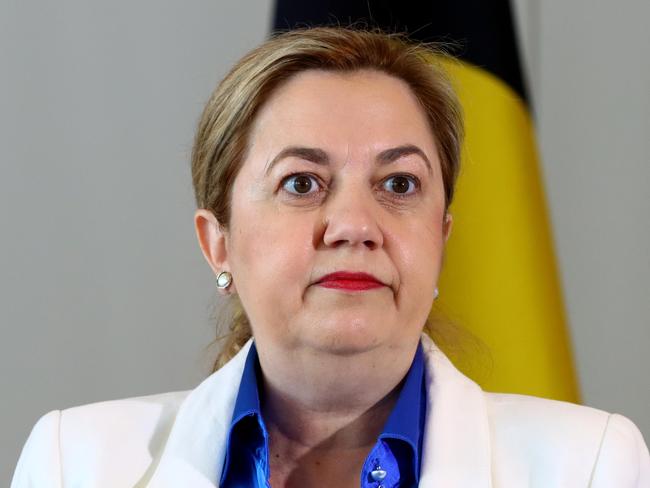‘Need to do their job’: Premier slams courts as youth crime laws overhauled
Annastacia Palaszczuk has taken an extraordinary swipe at Queensland courts, after unveiling youth justice reforms.
QLD News
Don't miss out on the headlines from QLD News. Followed categories will be added to My News.
- Explained: How Qld has toughened its stance on young crims
- Editor’s View: State’s late action doesn’t go far enough
Deputy Premier Steven Miles has backed Annastacia Palaszczuk’s extraordinary swipe at the courts – as he insisted the government’s latest suite of youth justice reforms had been in the works for some time.
The Premier sensationally declared on Thursday that the courts “need to do their job”, as she unveiled new penalties for offenders in what she touted as the “most comprehensive response to youth crime in this state”.
Mr Miles stood by Ms Palaszczuk’s comments about the courts on Friday, saying they reflected the views of the community.
“I think the Premier was very clear yesterday when she said that the courts were not meeting the community’s expectation in terms of allowing offenders onto bail and out of the custodial system to commit further crimes,” he said.
“And that’s why a key element of the package of reforms that were announced yesterday was requiring that the courts consider previous breaches of bail in determining sentencing and bail decisions.”
Amid suggestions from the Opposition that the new reforms had the “appearance of a thought bubble”, Mr Miles said the government had been considering the changes for some time.
In response to Ms Palaszczuk’s comments about the courts, Shadow Attorney-General Tim Nicholls said he believed the judiciary was doing what the law told them to do.
“You can’t blame the magistrates or the judges when the government says detention as last resort and for the minimum possible time,” Mr Nicholls said.

In its first term, the government amended the Youth Justice Act to reinstate the sentencing principle that a detention order should be imposed only as a last resort and for the shortest appropriate period.But the measures are already facing scrutiny from legal and criminal justice experts, including solicitor Bill Potts, who branded moves to increase car stealing penalties as a “cynical attempt at public relations”.
Under the Premier’s shake-up, the maximum punishment for stealing a car – regardless of the age of the offender – will increase from seven to 10 years in jail.
But if the offence is committed at night, if the offender is armed, or if the offender uses violence, the penalty will increase to a harsher sentence of up to 14 years in prison.
Criminals will also be given stricter penalties if they gloat on social media about their law-breaking antics.
The government also announced it would introduce laws to compel the courts to consider the previous bail history, criminal activity, and track record of youth offenders when sentencing them.
“The time for action is now and today we are announcing our most comprehensive response to youth crime in this state,” Ms Palaszczuk said. “We also recognise that community safety has to come first here and we stand with the community members across Queensland.”
The government also revealed it would build two new youth detention centres – with one to be in Cairns and the other to be built in a yet-to-be-announced location in the state’s South East.
Laws will be introduced to parliament in February to deliver the reforms, with Ms Palaszczuk rebuffing the LNP’s suggestion to immediately recall parliament as a “stunt”.
As she was asked how she could get the judiciary to deliver the increased sentences, Ms Palaszczuk said: “Can I be upfront and be frank – the courts need to do their job.
“There are separation of powers and you’ve heard my comment and I stand by my comment.”
Mr Potts, who is the former president of the Queensland Law Society, said the government was “not only renumbering, but also renaming the deck chairs on the Titanic” with its new measures.
When asked about the government’s plan to amend the Youth Justice Act to require the courts to take into account bail history, criminal activity and “track record” when sentencing, Mr Potts said it had already happened.
“They already take them into account, both under section 16 of the Bail Act and also section 9 of the Penalties and Sentences Act,” he said.
Mr Potts also criticised amending the maximum penalty for stealing a car.
“We know a 15-year-old at 2am in the morning, perhaps it is not forefront of their mind the extra penalty of adding three years to the charge of stealing a car,” he said.
“So the object of the law, if it’s to deter that individual or other like-minded people, it is just a sheer and utter cynical attempt at public relations rather than being serious about crime.”

About 88 per cent of child offenders received a non-custodial sentence for the unlawful use of a motor vehicle when it was their most serious offence, according to the Queensland Sentencing Advisory Council’s analysis of figures from 2005 to 2020.
Only 6.4 per cent of those convicted child car thieves were sentenced to the harshest penalty, detention, while 22 per cent got probation, 21 per cent received community service, and 15 per cent got a court-ordered conference, the QSAC figures state.
Under the changes announced on Thursday, the government announced it would also invest $9.89m to fast-track sentencing in a bid to cut the time children spend on remand.
Bond University criminologist and former police detective Dr Terry Golds-worthy said the govern-ment’s announcement was “better than nothing”. “There is still no breach of bail offence for youth offenders and this is needed to be a cornerstone of any response,” he said.
“It is a missed opportunity by the government to clamp down on the bail issues that have clearly become the spotlight of serious youth offending in Queensland.”
Before the Premier’s announcement on Thursday, manager of opposition business, Andrew Powell, called for parliament to be immediately recalled to address youth crime. “The first day parliament sits, breach of bail must be introduced as an offence for juvenile offenders and we will work with the government to pass a suite of reforms to the Youth Justice Act,” he said.
Police Minister Mark Ryan said the introduction of penalties for criminals who boasted about their crimes on social media would be a “circumstance of aggravation” that courts would need to consider.
“Circumstance of aggravation would usually mean that you would have a more severe penalty,” he said.
More Coverage
Originally published as ‘Need to do their job’: Premier slams courts as youth crime laws overhauled




